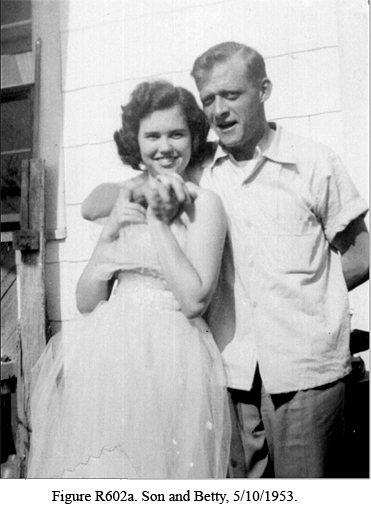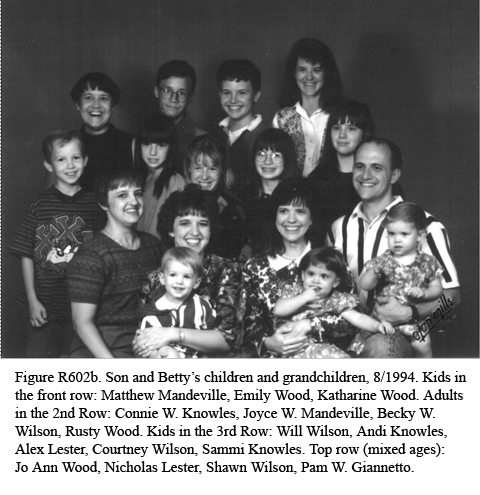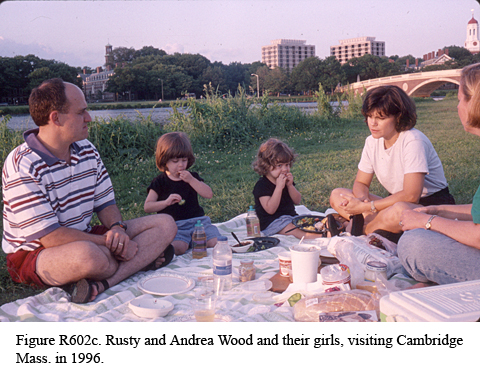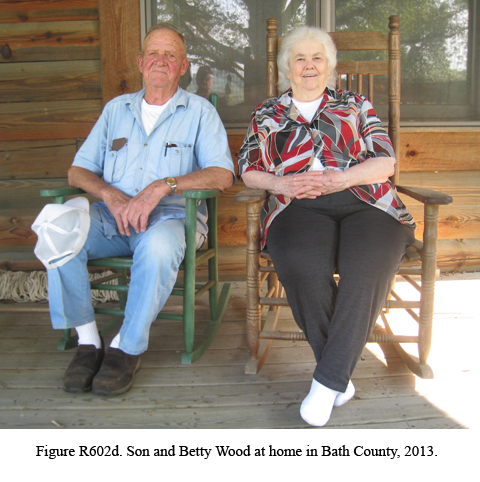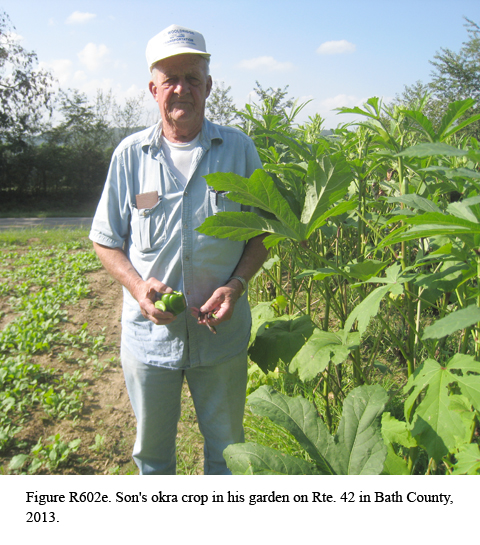R602
Husband: Gerald (Son) Wood
Father: Russell Guy Wood [R556]
Mother: Madge (Shue) Wood [R556]
Born: 8/19/1929
Wife: Betty (Bass) Wood
Father: Stacy B. Bass, 4/21/1892-8/21/1993, b. in Covington County,
Ala.
Mother: Alline Rowell, 2/17/1901-3/11/1974, b. in Covington County,
Ala.
Married: 1953
Children: (Fig. R602b)
JoAnn (Jody) Wood, b. 1/5/1954 in Montgomery, Ala.
Connie Wood, b. 12/12/1954 in Montgomery, Ala. M. 6/6/1974 to
Jeffrey Ted Knowles, ch. Samantha Gale (Sammy, b. 10/23/1980),
Andrea Rebecca (b. 2/3/1984)
Rebecca (Becky) Wood, b. 3/19/1957 in Montgomery, Ala. M.
12/27/1977 to Billy Shannon Wilson, ch. Michael Shawn (b.
4/18/1979), Courtney Shanna (b. 5/26/1981), William Daryl (b.
1/15/1985)
Pamela (Pam) Wood, b. 3/2/1959 in Lockbourne Air Force Base,
Ohio. M. 1st in 1978 to Floyd Nicholas Lester, ch. Nicholas David
Paul (b. 11/8/1979), Alexandra Nicole (b. 9/26/1982); m. 2nd
3/15/1992 to John Gianetto (no ch.)
Russell (Rusty) Stacey Wood (Fig. R602c), b. 4/7/1960 in
Stephenville, Newfoundland. M. 8/16/1986 to Andrea Leedy, ch.
Emily Grace and Katharine Mary (b. 1/7/1993; triplets, with Luke,
who was stillborn)
Joyce (Didder) Wood, b. 3/11/1967 in Montgomery Ala. M. 4/15/1989
to John Richard Mandeville Jr., s. Matthew Tyler (b. 3/31/1993)
(2013) See Son’s account of Bath County life in the 1930s in [R556]. The following is edited from a taped interview with Son and Betty Wood, 8/93.
Reacting to Charles Wood’s summers at Nimrod Hall in the 1920s [R600], “...things weren’t a bit different in the ‘30s than they were in the ‘20s, with respect to working at Nimrod. I mean, the same jobs were to be done. Each morning, when the beans came in, we had to pick two bushels of beans, dig two bushels of potatoes; on Saturday, we had to kill 40 to 100 chickens, depending on how many Camp kids and how many Nimrod guests were there. And the big five-gallon hand-crankers, I’ve turned ‘em a many a time. This Miz Tinsley out of Goshen was the pantry lady, and I used to watch her skim the cream off of the milk that was milked right over there, and hold it all week to make the ice cream that was on the weekends. And she mixed up those big batters, and we’d get out there and Frank’d holler at us, and the old freezer it’d begin to harden up, you couldn’t turn it, and then Gene Scott [see S154] would come up there with that muscle about as big around as a watermelon, and he’d crank it through. And then old Miz Tinsley’d come out there and shake that dasher until there wasn’t hardly anything left on it, and then give us the dasher. So for an hour’s work, you may have gotten a handful of ice cream.
“...The Wellfords, the Lundsfords, the Jenningses, and Mr. Taylor―you remember him? Henry Taylor? He was president of either a big bank or the C&O Railroad, one. All of those people came to Nimrod...We caught the hellgrammites and the cat minnows, and sold ‘em for a quarter to...the hellgrammites seventy-five [cents a dozen]...about the same as Charles did in the twenties. Seventy-five for the cat minnows...they’d give Scott five dollars and a pint of whisky to pick ‘em up down at the Crizer place, or at the old Lynchburg Camp, or on a short run down here at the old Lawrence Place. And these guys made almost as much money doing that as they did all winter at their regular jobs, ‘cause school bus drivers back in those days didn’t get much, maybe $30 a month.
“...Gene Scott [S154] would put [brother] Bob and I up to all kinds of things. Scott, being older than we were, he’d advise us, ‘Man, you can make wine out of anything.’ Well, he told me how to make dandelion wine; or I thought I understood him. But I gathered the flowers, and put ‘em in the fruit jar. And I stole some yeast cake to kick it with, and I put a little sugar in it, and Scott said for God’s sake don’t screw the lids down on it tight. Said it’s got to―you know, “thump” as we called it. So―I don’t know how many jars I had, but I put ‘em down in Grandmaw’s [Madge Wood’s] cellar over there. And she went in there one time during the summer to get something, well these things were letting off that gas, and they were hissing. And she thought it was snakes. And I don’t know whether it was Bob or me that got to it first, the only way we could make it quit hissing was to screw the lids down. Well, either that night or very soon thereafter Grandmaw, when we came in, I knew she was terribly unhappy, because she had a knack for ranting and raving. She says, “Go down there and look in my cellar.” And good Lord, the old wined-out soured dandelions were all over the floor, where them things busted...”
Son enlisted in the U. S. Air Force in July of 1948, and served until September 1968. “...in ‘48, out of basic training, I went to Spokane Washington, and was assigned to a B-29 bomber squadron. I went from there to England, and Germany, the Azores―now, I’m talking these 90-day TDY things that we went on back then. That was the way we deployed. And we came back through Tampa Florida, went back to Spokane Washington...I was in the Berlin airlift, too...
“From Spokane Washington [I went] to Shepherd Air Base in Wichita Falls Texas, for one year of airplane and engine school. I asked for reassignment from there to Langley Field Virginia, but was sent instead to Nagoya Japan. Close, wasn’t it? And stayed from May of 1950 until November of 1952, with 5th Air Force Headquarters. We did everything from fly support, to evacuate wounded, to light up the sky at night with flares for convoy bombings...I was reassigned in November ‘52 to Maxwell Air Base in Montgomery Alabama. Flew on B-52s from ‘52 to ‘58...”
In Montgomery, Son met and married Betty. “...In 1958 I was reassigned to a KC-97 tanker outfit in Lockbourne Ohio. Stayed there one year, and was reassigned to Harmon Newfoundland, as a base station, in a tanker outfit. Then we flew, well, to Greenland, Iceland, Labrador, Baffin Island, Northwest Territories; the north―that was our route. Our primary mission was, back then SAC had a mission know as “Leapfrog”―they would send two jet bombers from any stateside base to England, and load ‘em with nuclear weapons, and have ‘em ready to go on this what they called “short alert:” a minute from alert to takeoff. And these planes flying over, we would intercept and refuel ‘em, going and coming. This was a continuous operation. And―when did we come out of there? In ‘62 I was reassigned to Biloxi Mississippi for a computer school. And from there, was assigned over to Bedford radar site, part of NORAD. And in ‘66 was assigned to southern Headquarters for NORAD in Montgomery Alabama. 32nd Air Division. And stayed there till retired; was offered a grand tour of Bangkok, and respectfully declined. Well, about that time I had to do something: the money, and the kids were getting up to college age, and there was no way. So I had to go to work...I was heavy into computers when I retired out of the Air Force, and [after a six-month waiting period for bureaucratic reasons, I joined] the Air Traffic Division of the FAA in April of ‘69, and stayed in Atlanta with them until September of ‘84, in Air Traffic heavy computer maintenance―programming maintenance is what I was involved in.
“During the time I was with ‘em, the sky-jackings to Cuba were real bad, you may recall. And we almost weekly had FBI monitors, monitoring sky-jacking either heading to Cuba or going somewhere else. And we would do whatever we could―there wasn’t much we could do―when we tracked the plane and we’d put fighter escorts behind and below, where the skyjackers couldn’t see―it would get pretty―well, like hairy at times...
“I weathered the mighty air traffic control strike of ‘81, with three years to go. They wanted us to strike; if we would have struck we could shut it down, but air traffic couldn’t do it. They thought they could, and within two weeks after Ronald Reagan gave ‘em 48 hours to cool off, he gave ‘em ten minutes to come in and state why they shouldn’t be released, and he fired every one of ‘em. We lost 714 controllers.”
Betty’s family came to Alabama from Ireland, via Virginia and North Carolina. Her great- or great-great-grandfather had married an Indian woman, and their children were forbidden to attend public school, because they were considered half-breeds. Betty remarks, “My granddad fought in the Civil War, but he fought for the north for the simple reason that he didn’t believe in slavery. And none of the Basses ever owned slaves. None of my grandfather’s forefathers. None of ‘em owned slaves. They raised their own!” Betty’s father “...was in France during World War I, and contracted TB, and he was in the hospital in Johnson City Tennessee, and was told he had six months to live, when he only had one child: he raised nine children, as a dirt farmer―the worst thing in the world for TB, but then he lived to the ripe old age of 101.”
Betty continues, “I was born and raised on a farm in south Alabama, and I stayed there until I was seventeen, and then I went to Kansas and stayed with a sister till I was eighteen, and come back and worked for Southern Bell, as an information operator in Montgomery; and I met [Son] the day after I was twenty years old; in January of ‘53, and we got married in May of ‘53; and I worked for Southern Bell off and on then, till about―I worked with ‘em till ‘57...and I didn’t work any more until my children were all in school.”
Son and Betty retired to Bath County in 1984, and built an elegant log house (Fig. R602d) immediately behind what had been Russell Wood’s Esso station [R556], now a hunt camp.
First daughter JoAnn received her B.S. from the University of Georgia, and is currently a doctoral candidate in education at New York University. Connie and Ted Knowles live in Fayetteville Ga., where he does design work for a woodworking company and she is a Registered Nurse with Eggleston Rainbow Clinics, a subsidiary of Emory University.
Becky and Shannon Wilson live in Andalusia Ala. He works on offshore oil rigs in the Gulf, and Becky is a Draftsperson for Dorsey Trailer Co. of Elba Ala. Pam and John Giannetto live in Darlington S.C.; they are both Air Traffic Controllers with the FAA. She is the Training Instructor for their site, at Florence S.C.
Rusty and Andrea live in Fayetteville, Ga. She is a full-time wife and mother while he, formerly an Air Force fighter pilot, is a pilot with Delta Airlines. He is an Air Force Reserve Major, attached to a Quality Control unit at Hanscom Air Force Base in Bedford Ma. Joyce (Didder) and Johnny live in Troutville Va. He is an Investigator with the Botetourt County Sheriff’s Department, and she works in the Finance Department of Carter Machinery in Salem Va. Joyce, who has a degree in Business Management, is working to finish another degree in Elementary Education (in her spare time, after being a wife, homemaker, and mother).
